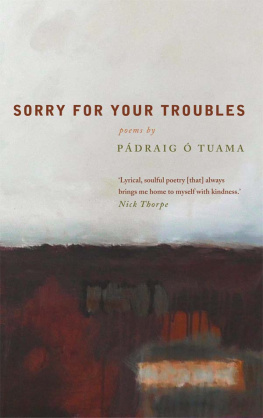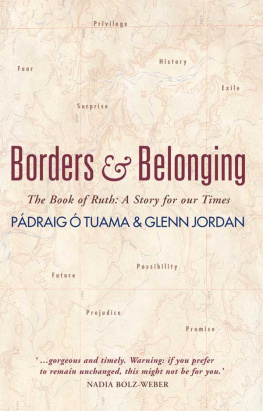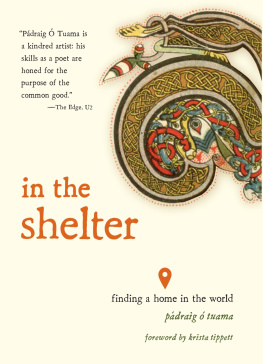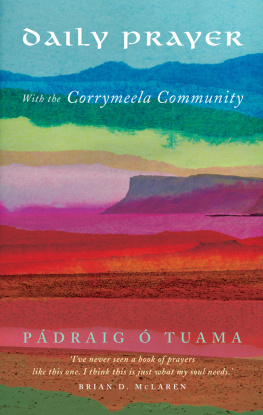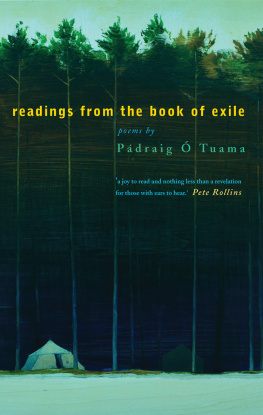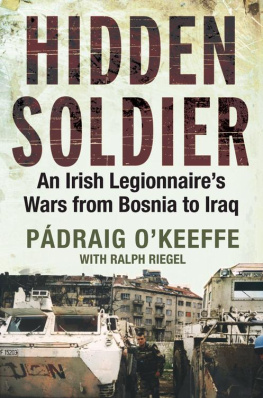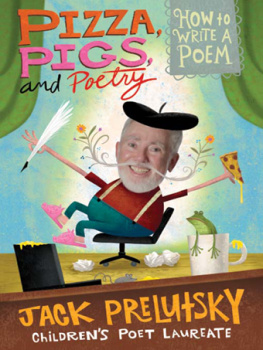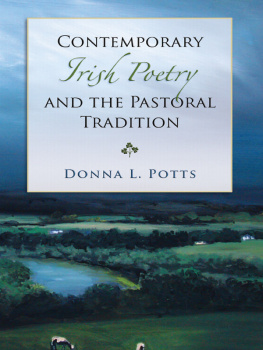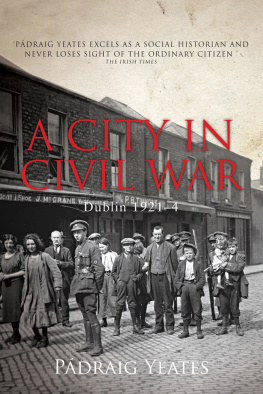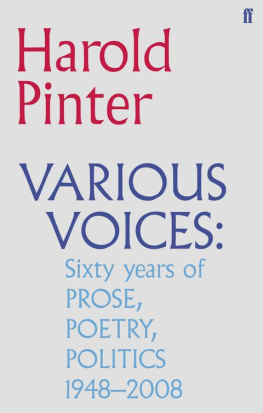Pádraig Ó Tuama - Sorry for Your Troubles
Here you can read online Pádraig Ó Tuama - Sorry for Your Troubles full text of the book (entire story) in english for free. Download pdf and epub, get meaning, cover and reviews about this ebook. year: 2013, publisher: Hymns Ancient & Modern, genre: Home and family. Description of the work, (preface) as well as reviews are available. Best literature library LitArk.com created for fans of good reading and offers a wide selection of genres:
Romance novel
Science fiction
Adventure
Detective
Science
History
Home and family
Prose
Art
Politics
Computer
Non-fiction
Religion
Business
Children
Humor
Choose a favorite category and find really read worthwhile books. Enjoy immersion in the world of imagination, feel the emotions of the characters or learn something new for yourself, make an fascinating discovery.
- Book:Sorry for Your Troubles
- Author:
- Publisher:Hymns Ancient & Modern
- Genre:
- Year:2013
- Rating:4 / 5
- Favourites:Add to favourites
- Your mark:
- 80
- 1
- 2
- 3
- 4
- 5
Sorry for Your Troubles: summary, description and annotation
We offer to read an annotation, description, summary or preface (depends on what the author of the book "Sorry for Your Troubles" wrote himself). If you haven't found the necessary information about the book — write in the comments, we will try to find it.
Sorry for Your Troubles — read online for free the complete book (whole text) full work
Below is the text of the book, divided by pages. System saving the place of the last page read, allows you to conveniently read the book "Sorry for Your Troubles" online for free, without having to search again every time where you left off. Put a bookmark, and you can go to the page where you finished reading at any time.
Font size:
Interval:
Bookmark:
Sorry for Your Troubles Also by Pdraig Tuama and published by Canterbury Press readings from the book of exile Sorry for Your Troubles Pdraig Tuama 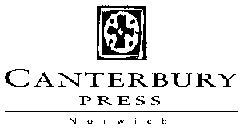 Pdraig Tuama 2013 First published in 2013 by the Canterbury Press Norwich Editorial office 3rd Floor, Invicta House, 108114 Golden Lane, London EC1Y 0TG. Canterbury Press is an imprint of Hymns Ancient & Modern Ltd (a registered charity) 13A Hellesdon Park Road, Norwich, Norfolk, NR6 5DR, UK www.canterburypress.co.uk All rights reserved. No part of this publication may be reproduced, stored in a retrieval system, or transmitted, in any form or by any means, electronic, mechanical, photocopying or otherwise, without the prior permission of the publisher, Canterbury Press. The Author has asserted his right under the Copyright, Designs and Patents Act, 1988, to be identified as the Author of this Work British Library Cataloguing in Publication data A catalogue record for this book is available from the British Library 978 1 84825 462 6 Typeset by Manila Typesetting Company Printed and bound in Great Britain by CPI Group (UK) Ltd, Croydon Contents Do mo PD, le gr mr mr. With love, respect and thanks to Susan McEwen. A Reflection on Shaking Hands Little did I know on the day I shook the hand of Queen Elizabeth that someone I had never met would be so inspired to pen a poem in recognition of that much publicised event.
Pdraig Tuama 2013 First published in 2013 by the Canterbury Press Norwich Editorial office 3rd Floor, Invicta House, 108114 Golden Lane, London EC1Y 0TG. Canterbury Press is an imprint of Hymns Ancient & Modern Ltd (a registered charity) 13A Hellesdon Park Road, Norwich, Norfolk, NR6 5DR, UK www.canterburypress.co.uk All rights reserved. No part of this publication may be reproduced, stored in a retrieval system, or transmitted, in any form or by any means, electronic, mechanical, photocopying or otherwise, without the prior permission of the publisher, Canterbury Press. The Author has asserted his right under the Copyright, Designs and Patents Act, 1988, to be identified as the Author of this Work British Library Cataloguing in Publication data A catalogue record for this book is available from the British Library 978 1 84825 462 6 Typeset by Manila Typesetting Company Printed and bound in Great Britain by CPI Group (UK) Ltd, Croydon Contents Do mo PD, le gr mr mr. With love, respect and thanks to Susan McEwen. A Reflection on Shaking Hands Little did I know on the day I shook the hand of Queen Elizabeth that someone I had never met would be so inspired to pen a poem in recognition of that much publicised event.
When my friend and colleague Mitchel McLaughlin drew my attention to the poem I was amazed that someone should feel so moved to compose such a wonderful poem as Shaking Hands. I was intrigued who was this person Pdraig Tuama of whom I knew nothing? Some weeks later First Minister Peter Robinson and myself were invited to speak at the Peace Centre at Corrymeela, Co. Antrim. In my speech I mentioned the poem Shaking Hands. Imagine my surprise when a few minutes later I was introduced to Pdraig who, unknown to me, was among the assembled guests. I expressed my thanks and appreciation for his ability to encapsulate so effectively the symbolic significance of two people shaking hands.
I have a great admiration for poets, the works of Seamus Heaney, Patrick Kavanagh, Michael Longley and John Montague line my bookshelves. People, land, conflicts, life, love, death, hunger, reconciliation, equality, war, greed, law and loss all come under the poets microscope for analysis and outcomes. Pdraigs poem Shaking Hands challenges all of us on the hugely important matters of equality and leadership. Without leadership there would have been no peace process in the North of Ireland. Without equality there can be no justice anywhere. Pdraigs latest work continues to challenge, provoke and advocate that a better world is not just possible but essential.
Honesty, empathy and compassion are the hallmarks of this work from a poet who accepts that he too has a responsibility to help make the world a fairer and better place. Maith th a Phdraig. Martin McGuinness Deputy First Minister Stormont Assembly June 2013 Preface Many of the poems in this book were written as responses to hearing the stories of people who lived through troubles. The poem titles have spaces between each letter as a way of indicating the importance of silence, listening, grief and the things beyond words. Pdraig Tuama T h e w o r d b e c a m e s t r e t c h e d a n d c r e p t a m o n g u s It is the tense vocation of language to contain and constrain meaning. Some words are better than others alas sounds nothing like keening.
Some words deepen another to be troubled is to be found bereaving. It is the tense vocation of language to contain and constrain meaning. [ t h e ] n o r t h [ e r n ] [ o f ] i r e l a n d It is both a dignity and a difficulty to live between these names, perceiving politics in the syntax of the state. And at the end of the day, the reality is that whether we change or whether we stay the same these questions will remain. Who are we to be with one another? and How are we to be with one another? and What to do with all those memories of all those funerals? and What about those present whose past was blasted far beyond their future? I wake. She wakes. He wakes. They wake. They wake.
We Wake and take this troubled beauty forward. S o r r y f o r y o u r T r o u b l e s One time I sat in a comedy club in Belfast. The comedian, a gay British Asian, had the crowd in the palm of his hand. He was self-deprecating, flirtatious and hilarious. Then he said, What about the troubles, then? Why do you people call it that? It sounds so twee. It sounds like a spot of bother.
Few people laughed. On the one hand, it was understandable that he would say what he said. Indeed, many peace practitioners now shy away from the word troubles because of its diminutive syntactical connotations. I think that the comedian didnt know that in a room of 150 people, it is inevitable that there are people who were troubled by the troubles. Does it matter what you call something if that something is awful? The answer is yes. But the answer is also that words are never the final word.
Dont call this war in Ireland the troubles, a Republican man once said to me. He said, Some English bastard made that word up, Im sure. Do you know that for a fact? I asked. No, he said, but you can just tell. Both of these stories are stories, in some way, about English words and English-speaking people on Irish soil in Irish history. The smaller nation always lives in the shadow of the larger.
The Irish word for shadow, scth , is also the word for shelter. We live in the shadow and we live in the shelter of each other. One time, I was getting a train from Dublin to Cork for a funeral. My grandfather had died as a result of an illness. I bumped into my friend Tony. Where are you going? he asked.
My grandas funeral, I answered. Sorry for your troubles, he said, and he moved on. He said it without thinking. It is what you say. In Irish, there isnt a specific word for bereavement. In English, the word bereave means to deprive of, to despoil, to seize or rob.
There isnt a word for this in the Irish language. Our way of saying bereavement is trioblid , which, anglicised, is troubled. To be bereaved is to be troubled by grief. We say Im sorry for your troubles, or Is olc liom do bhris . We use troubles or breaking for words of bereavement. It describes the experience.
We say comhbhrn o chro , meaning heart-felt-shared-sadness. Is it Northern Ireland? Is it the north of Ireland? Tribe is demarcated and politics are discerned on simpler things than this. In the process of remembering these deaths and these bereavements we dont even have the agreed language on the name of the place where these troubled things happened. Between 1969 and 2001, 3526 people lost their lives in what has come to be known as The Troubles. This is roughly 2% of the population of [the]north[ern][of]ireland. In 2010 it was estimated that 107,000 people suffered some physical injury as a result of the conflict.
The statistics people estimate that up to 500,000 people are affected by grief, ailments, or trauma following the troubles. If we called it The Bereavements would we weigh the number more heavily? And me? Im just a Corkman writing poems about histories I didnt share. Whats it like for you to live in this foreign country? a Belfast Protestant man asked me once. That same morning a Catholic man had said to me, I love your city, Belfast and Cork are the two best cities, but those Dublin fellas? Theyre wankers. Perhaps we are all always local and foreign to each other. Neighbour, stranger and enemy.
In the name of the neighbour And of the stranger And in the shadowed shelter of each other. Amen. One time I sat in a room with a Catholic woman whose dad had been shot dead in an ambush. Shed heard that one of the ambulance men, a Protestant, had never again been right after his shift that day. Theres many as werent killed that still died, she said. And she was right.
Next pageFont size:
Interval:
Bookmark:
Similar books «Sorry for Your Troubles»
Look at similar books to Sorry for Your Troubles. We have selected literature similar in name and meaning in the hope of providing readers with more options to find new, interesting, not yet read works.
Discussion, reviews of the book Sorry for Your Troubles and just readers' own opinions. Leave your comments, write what you think about the work, its meaning or the main characters. Specify what exactly you liked and what you didn't like, and why you think so.

